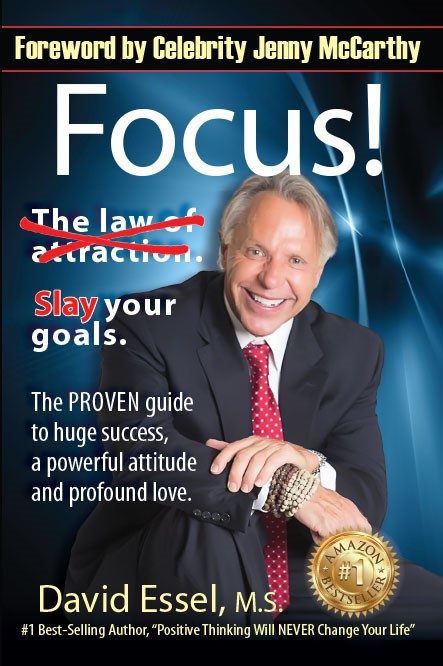- Home
- Editor's Notes
- Current Issue
- Riki Reflects
- Spiritual Traveler
- Starz Emporium
- Classifieds
- Advertise with Us
- Submissions
- Awards
- About Us
- Contact Us
The ego has two sides, and it’s not all bad news
By David Essel
 The word ego has been so malaligned, that many people when they use the word they use it from one context only… That is the concept of the “big ego, self-centered , arrogant individual.“ But that’s not really what it was designed to be described. Sigmund Freud would use the word ego to talk about the conscious mind, or maybe you could look at it as defined as someone’s existence and or identity. But, like so many other terms in the world of personal growth and psychology, pop psychology has turned many concepts into overly simplified definitions that don’t really serve us very well. For the last 28 years, number one best-selling author, counselor and life coach David Essel has been helping to demystify concepts such as “the ego“, and to explain to individuals that there’s a yin and a yang to everything in life. What David means by that, is that if there is a “definition of the ego that is all about self-centeredness, such as “he has such a big ego“, then there must be a polar opposite side of that as well. And in David’s teachings below, he shares what he means by the two sides of the ego. “In 1996, when I put together our three manuals for the life coach certification program that I devised, I knew one of the major topics that we were going to have to dive into would be the definition of the ego. Over the years, unfortunately due to my own profession of personal growth, so many experts have talked about the ego from a negative point of view. “He has a big ego, she is so self-centered, he’s so materialistic that his ego is out of control, her ego is so huge that she thinks every man in the world wants her.“ And while some of that might be true, it sure changes the true definition in my mind of what the ego really stands for. So in my initial teachings, I helped people to understand that there is a Yin to every Yang in life. There is daylight, there is darkness. There is the big ego, and there is a little ego as well. So the big ego is the ego everyone talks about… Self-centeredness, cocky, arrogant, only concerned about getting our own individual needs met. But, as I tell everyone, if there is a big ego then somewhere lurking around the corner must be the little ego. So in 1996, and we use this definition for the small ego: “the small ego is Buddha nature, Christ consciousness, service, loyalty, humility , Vulnerability, humor, and, one of the most powerful traits of the small ego, is to apologize when we are wrong.“ When I work with clients one on one, or speak to large groups, I’m constantly reminding everyone about the two different egos. If we get too hung up on only thinking about one form of ego, then anytime we talk about the ego it’s outrageously negative. But let’s look at this, when we talk about the small ego in regards to being of service, we could also say that someone who devotes their life to helping others has high self-esteem, or self-love, and that same person just may have high self-confidence, the ability to go out and to look for opportunities to help others instead of always worrying about getting our own needs met. Talking about ego in terms of big ego only, highly limits us to grow as human beings. I think it’s brilliant when someone is so confident, that they can stand on stage, talking about principles that others might not agree with, but because of their humility, they don’t necessarily take criticism personally… At least not as deeply as someone who is entrenched with a big ego who has to be right all the time. Does this make sense? I think the big ego needs to be minimized in many peoples lives, the narcissist, truly self-centered person obviously needs to start looking at their big ego, the need and desire to always be right, as something that could be holding them back. On the other hand, trying to expand the small ego, to be more humble, honest, open and vulnerable can lead to immense spurts of personal growth. As an exercise, why don’t you judge yourself right now as which ego has more control over your life? Which is it for you? Do you have an intense desire to always be right, even if it brings you constant chaos and drama at work, home, or with your friends? Or, do you have the ability, the vulnerability and humility, that when you’re wrong, you can admit you’re wrong and not feel overly embarrassed because you’re just human? In our brand new book “focus! Slay your goals… The proven guide to huge success, powerful attitude and profound love”, I actually apologize in the first chapter for so many errors I made in the first 16 years of my career, where I taught principles that we’re not actually true. I used to travel around the world telling people that if they use the right affirmations, “that whatever they believe they can achieve, and whatever they put the most positive thoughts behind, must come into their lives.“ In this book , our 10th one, I apologize profusely for being 100% incorrect. I was wrong. I was being a parrot , just expounding upon principles that many of my teachers taught me, that were not true at all. And so many people already, have written to us appreciating my honesty, and telling me in email form that I must be a very confident person to call myself out in the way I did in my very own book . To me, this is an example of the small ego. My humility, my vulnerability, was more important than being right. By telling all of the readers of my book that I had made mistakes in the past, and I was trying to make amends for those errors, allows them to feel that it’s OK to admit that they’ve made errors in the past, and their desire to set the record straight in their lives today would be an example of the small ego expanding, the small ego at work. . I believe by understanding the ego at the level we are describing in this article, many more people can start to become comfortable with the definitions of the ego, and relate experiences to either the big ego or the little ego, the big ego or the small ego, instead of lumping them all together into the “evil side of the ego as many people want to describe it today.“ Make a decision after doing the writing exercise above, to start to shift your world. If you’re living in arrogance and conceit, then you’re living too strongly in the big ego, and you can start to switch to become more humble, more vulnerable and more of service, and in this way you’re beginning to expand the small ego side of your life… The side that truly matters when we look at joy, happiness and even better emotional and physical health.” David Essel‘s work has been endorsed by individuals like the late Wayne Dyer, and celebrity Jenny McCarthy says “David Essel is the new leader of the positive thinking movement.“ His work is also verified by psychology today, and marriage.com calls him one of the top relationship experts in the world. His 10th book , “focus! Slay your goals… The proven guide to huge success, a powerful attitude and profound love“, is now available and comes with a 100% moneyback guarantee. Mention this article and get a free 15 minute phone counseling session, simply email David and his team at the website below: www.davidessel.com |
Share this article with friends!
|
Copyright © 1998 - 2026 Mystic Living Today All rights, including copyright, in the content of these Mystic Living Today web pages are owned or controlled for these purposes by Planet Starz, Inc. Terms of Service Disclaimer and Legal Information For questions or comment, contact Starzcast@mysticlivingtoday.com. Reproduction of this page in any form is not allowed without permission of the author and the owner of this site. All material on this web site, including text, photographs, graphics, code and/or software, are protected by international copyright and trademark laws. Unauthorized use is not permitted. You may not modify, copy, reproduce, republish, upload, post, transmit or distribute, in any manner, the material on this web site. Unless permissions is granted. |



